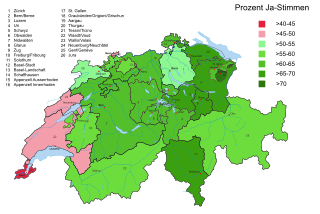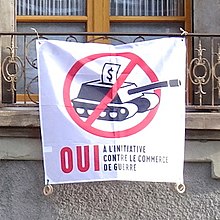
The government of Switzerland is a federal state with direct democracy.

Christoph Wolfram Blocher is a Swiss industrialist and politician who served as a Member of the Swiss Federal Council from 2004 to 2007. A member of the Swiss People's Party (SVP/UDC), he headed the Federal Department of Justice and Police. As an industrialist, he became wealthy as CEO and majority shareholder in the EMS-Chemie corporation, now run by his daughter, Magdalena Martullo-Blocher.

The Swiss People's Party, also known as the Democratic Union of the Centre, is a national-conservative and right-wing populist political party in Switzerland. Chaired by Marcel Dettling, it is the largest party in the Federal Assembly, with 62 members of the National Council and 6 of the Council of States.
Same-sex marriage has been legal in Switzerland since 1 July 2022. Legislation to open marriage to same-sex couples passed the Swiss Parliament in December 2020. The law was challenged in a referendum on 26 September 2021 by opponents of same-sex marriage and was approved with the support of 64% of voters and a majority in all 26 cantons. The law went into force on 1 July 2022. A provision of the law permitting same-sex marriages performed abroad to be recognised in Switzerland took effect on 1 January 2022. Switzerland was the seventeenth country in Europe and the 30th in the world to allow same-sex couples to marry.
Voting in Switzerland is the process by which Swiss citizens make decisions about governance and elect officials. The history of voting rights in Switzerland mirrors the complexity of the nation itself. The polling stations are opened on Saturdays and Sunday mornings but most people vote by post in advance. At noon on Sunday, voting ends and the results are usually known during the afternoon.

Switzerland is not a member state of the European Union (EU). It is associated with the Union through a series of bilateral treaties in which Switzerland has adopted various provisions of European Union law in order to participate in the Union's single market, without joining as a member state. Among Switzerland's neighbouring countries, all but one are EU member states.

Lesbian, gay, bisexual, and transgender (LGBT) rights in Switzerland are progressive by world standards. Social attitudes and the legal situation have liberalised at an increasing pace since the 1940s, in parallel to the situation in Europe and the Western world more generally. Legislation providing for same-sex marriage, same-sex adoption, and IVF access was accepted by 64% of voters in a referendum on 26 September 2021, and entered into force on 1 July 2022.

The Group for a Switzerland without an army, is a Swiss political advocacy group founded in 1982 by 120 activists in order to abolish the Swiss army. Its roster has varied considerably; as of 2009 its website stated that it consists of about 20,000 members or supporters, consisting largely of pacifists and anti-militarists.

The federal popular initiative "against the construction of minarets" was a successful popular initiative in Switzerland to prevent the construction of minarets on mosques. In a November 2009 referendum, a constitutional amendment banning the construction of new minarets was approved by 57.5% of the participating voters. Only three of the twenty Swiss cantons and one half canton, mostly in the French-speaking part of Switzerland, opposed the initiative.
Ten referendums were held in Switzerland during 2008. The first two were held on 24 February on business tax reform and aircraft noise. A further three were held on 1 June on public information campaigns, naturalisation and health reform. The final five were held on 30 November on legalising cannabis, making the pension age flexible, restricting the right of appeal of associations against construction projects, amending the constitutional article on narcotics and eliminating the statute of limitations with respect to pornographic crimes against children.
Eight referendums were held in Switzerland during 2009. The first was held on 8 February on extending the freedom of movement for workers from Bulgaria and Romania. The next two were held on 17 May 2009 on introducing biometric passports and the "Future with complementary medicine" proposal. A further two were held on 27 September on increasing VAT and the introduction of public initiatives. The final three were held on 29 November on banning the construction of new minarets, exporting weapons and the use of aviation fuel taxation.
Six referendums were held in Switzerland during 2010; three in March on pension funds, animal protection and a constitutional amendment, one in September on unemployment benefits, and two in November on deporting foreign criminals and introducing a canton tax.
Twelve national referendums were held in Switzerland during 2012. On 11 March voters across the country were asked five questions on employment leave, second houses, building society savings, the Fixed Book Price Agreement and gambling revenues. On 17 June there were three questions on healthcare, foreign policy and home buying. On 23 September there were three on a smoking ban, secure housing in old age and music lessons at school. A final referendum was held on 25 November on the Animal Diseases Act.
Twelve national referendums were held in Switzerland during 2014.

In Switzerland, the federal popular initiative "against mass immigration" was a referendum that aimed to limit immigration through quotas, as it had been prior to the bilateral treaties between Switzerland and the European Union (EU) launched in 2002.
Thirteen national referendums were held in Switzerland during 2016.
Seven national referendums were held in Switzerland during 2017. Polling took place on 12 February, 21 May and 24 September, whilst no referendum was scheduled for the November date.
Federal referendums were held in Switzerland on 7 March, 13 June, 26 September, and 28 November 2021. Swiss referendums take three forms: popular initiatives, which are citizen proposals to create a new law and require 100,000 valid signatures on a petition to get on the ballot; facultative or optional referendums, which are citizen proposals to approve or reject a piece of existing law and require 50,000 valid signatures on a petition to get on the ballot; and mandatory referendums, which are required to revise the constitution, join an international organisation or introduce emergency federal legislation for over a year.

The 2021 Swiss same-sex marriage referendum was a facultative referendum held in Switzerland on 26 September 2021 about an amendment to the Civil Code to legalise marriage between people of the same sex, as well as adoption rights for same-sex couples and access to assisted reproductive technology for lesbian couples. The amendment was called "marriage for all" in Swiss public discourse.

Federal referendums were held in Switzerland on 13 February, 15 May and 25 September 2022. Swiss referendums take three forms: popular initiatives, which are citizen proposals to create a new law and require 100,000 valid signatures on a petition to get on the ballot; facultative or optional referendums, which are citizen proposals to approve or reject a piece of existing law and require 50,000 valid signatures on a petition to get on the ballot; and mandatory referendums, which are required to revise the constitution, join an international organization or introduce emergency federal legislation for over a year.













